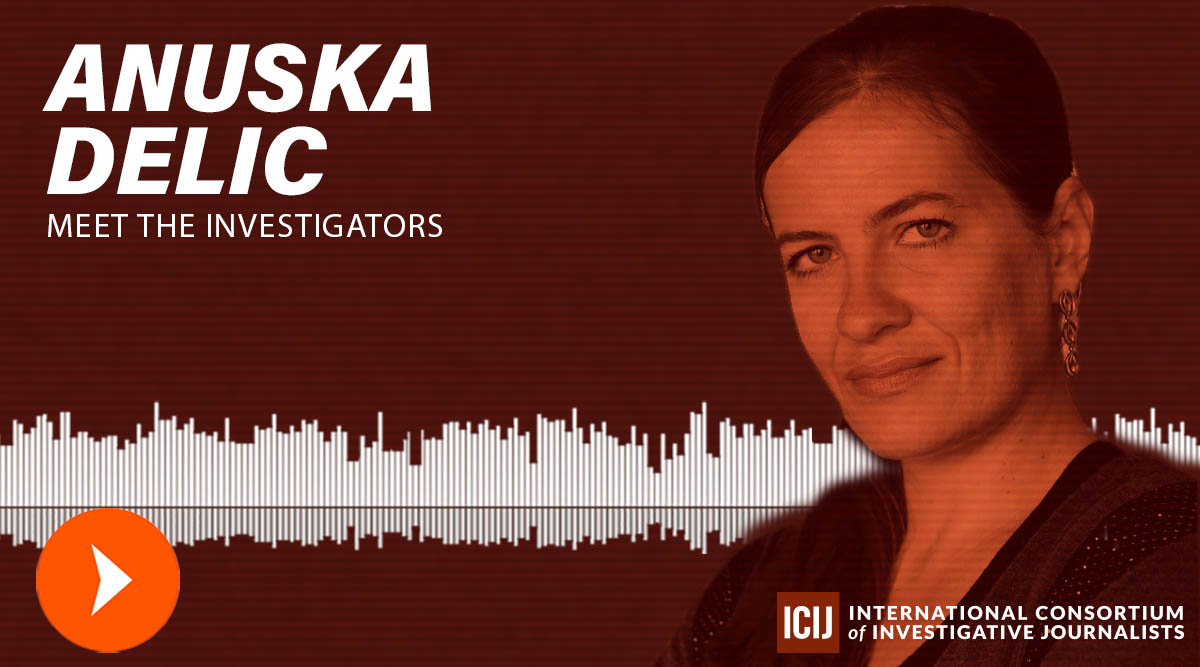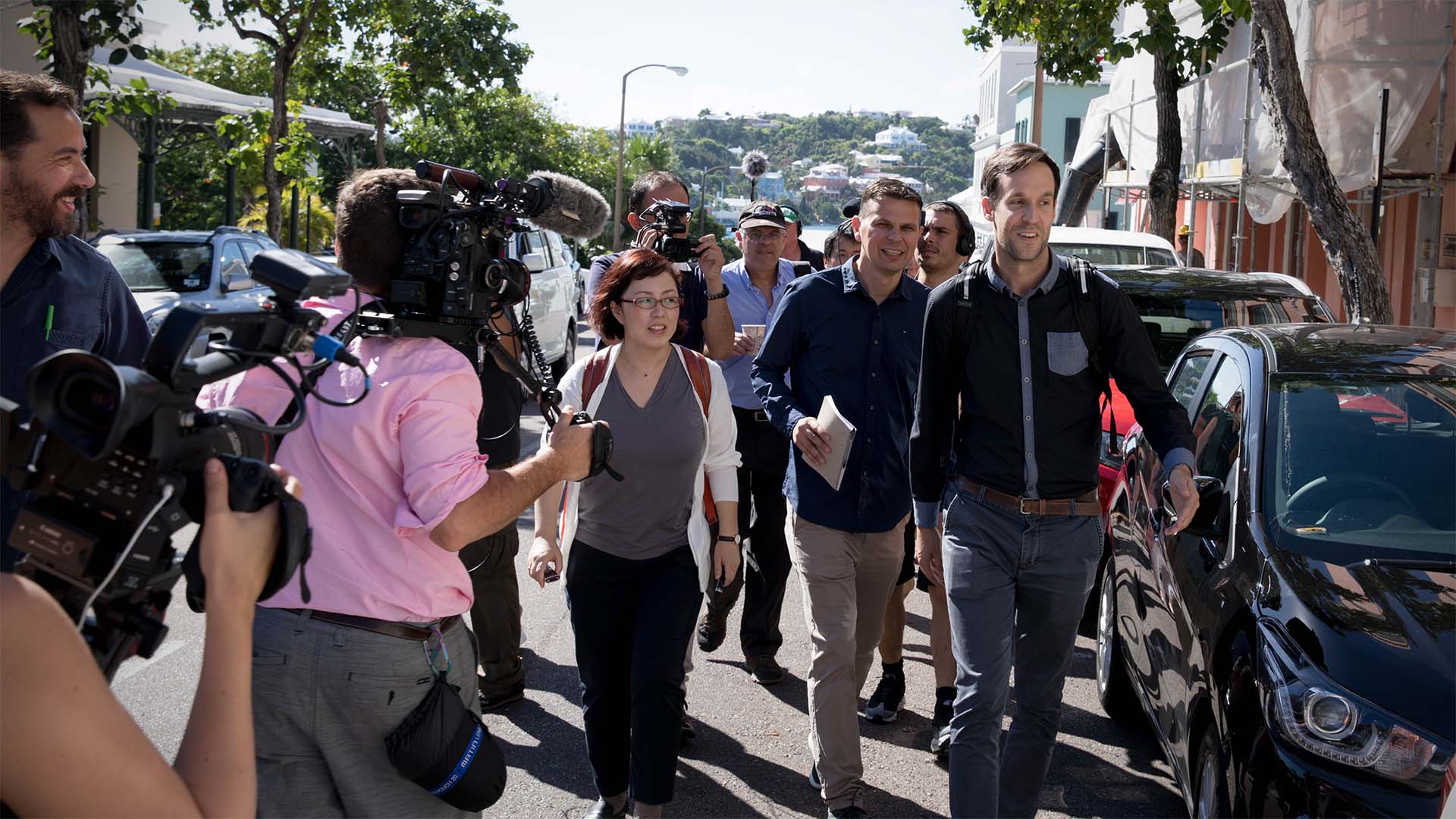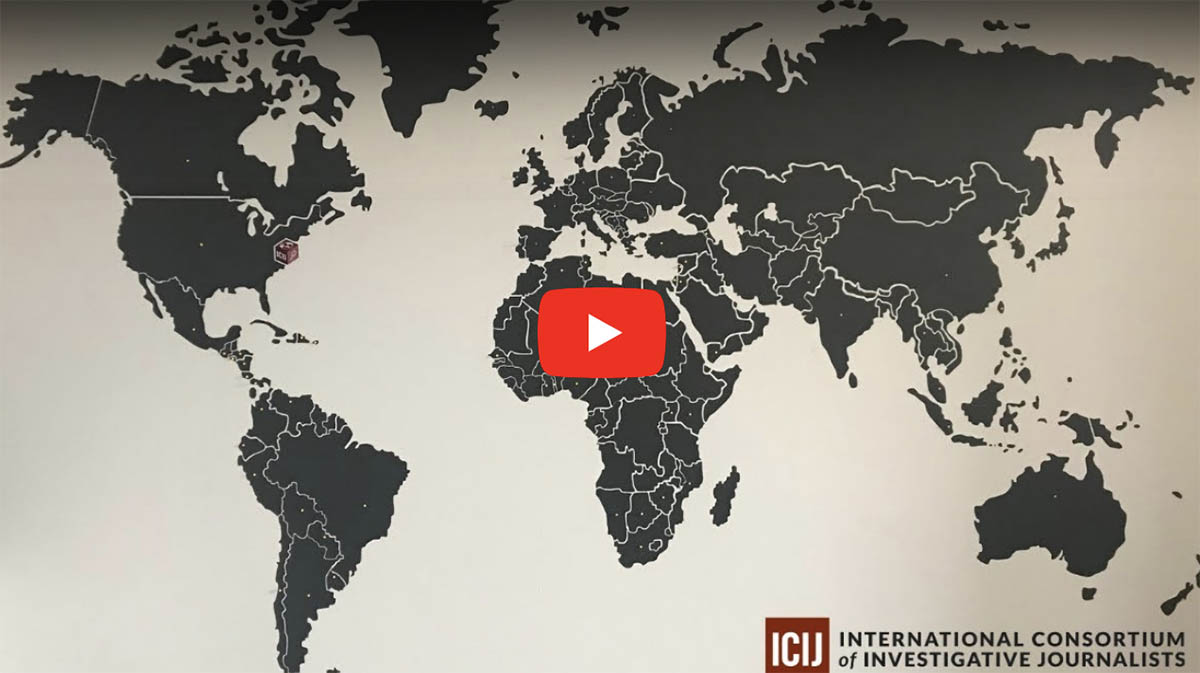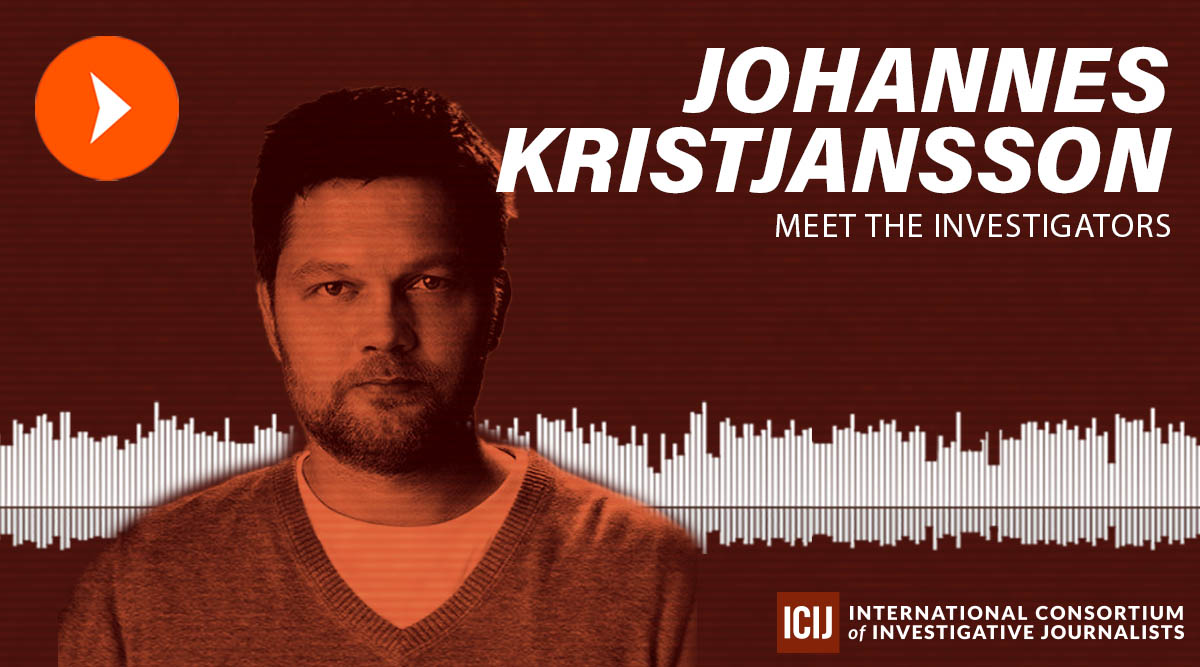MEET THE INVESTIGATORS
Independent research is the ‘mother of any investigation’
Go behind the scenes with Slovenian reporter Anuška Delic, a self-taught investigator who has helped pioneer independent and impactful investigative journalism in the Adriatic region and beyond.

The International Consortium of Investigative Journalists collaborates with hundreds of members across the world. Each of these journalists is among the best in his or her country and many have won national and global awards. Our monthly series, Meet the Investigators, highlights the work of these tireless journalists.
In July, we spoke with the seemingly indefatigable Slovenian reporter Anuška Delic, a self-taught investigator who has covered issues ranging from asbestos on state-owned train infrastructure to abuses of election campaign law, and has been honored and recognized numerous times for her groundbreaking work, including on ICIJ’s Panama Papers investigation. After a successful — and challenging — career in Slovenia’s established media outlets, Anuška went on to found Oštro — the first investigative journalism center focusing on the Adriatic Region.
ICIJ’s award-winning Meet the Investigators series is emailed exclusively to ICIJ’s Insiders each month before being published on ICIJ.org, and is one of a number of ways we like to thank our community of supporters who are so integral to our independent journalism. You can join our Insiders community by making a donation to ICIJ. Thanks to all our ICIJ Members who have shared their stories with us, and to all our supporters for helping ICIJ continue its work.
TRANSCRIPT:
Sean McGoey: Welcome back to the Meet the Investigators podcast from the International Consortium of Investigative Journalists. I’m your host, Sean McGoey, and this month, we’re talking to a Slovenian reporter who’s done just about everything that you can do in the world of journalism.
Anuška Delic: Hi, my name is Anuška Delic. I have many titles — founder, director, editor in chief, reporter, mentor, administrator, and probably something else in between.
McGoey: Here’s the rest of my chat with Anuška Delic.
How did you end up becoming an investigative journalist?
Delic: I went to college in Slovenia. But before that, I spent more than four years in New York. And soon after 9/11, I left to return back to Ljubljana, where the following year, I started studying journalism with people much younger than me. So yeah, I’m a late bloomer, and actually coming into investigative journalism was not really my trajectory. I had more interest in foreign policy.
While I was working at Delo, the main daily newspaper here in Slovenia — [I] probably was still a student then — I stumbled on a story about asbestos and rail infrastructure. There’s two types of asbestos, the soft and the hard one. This was a problem with the soft one, which is much more lethal as it ages — it’s basically the kind that was installed in the Twin Towers as insulation.
And it drew me in and I could never look back again, basically. I kind of just taught myself in the skills and the methods, because I didn’t really have many colleagues at the paper that were investigating a lot — investigative journalism is still not “a thing” in Slovenian newsrooms.
McGoey: Is there a particular journalistic skill that you’ve developed that you look back on your early career and wish you had when you were getting started?
Delic: I would spend less time now on unimportant things. Now, it’s easier for me to see — in most cases — the point of a story. But then, I was just kind of trying to wrap my brain around what I’m doing.
Although it was my first investigation, it just sort of solidified in me a feeling that every journalist always has to do their own independent research before going to speak to anyone, especially if they’re experts. That’s something that maybe people are told in college in passing, but it is something that you need to understand when you’re going in early on, and then it stays with you.
McGoey: Why is that front-end research so important for journalists who are consulting with expert sources?
Delic: Research has to be done to a certain stage where a reporter can independently say, “Okay, I think the story is here, and this is why,” and [then] when that reporter goes to an expert, he or she will be able to put forward questions that are meaningful to that particular angle, problem [or] issue that the reporter has uncovered.
I see a lot of young reporters, they just sort of blind call people. They can be sold anything, because they don’t have their own pre-existing and independently gathered knowledge of the topic. So it’s very easy to send them in the wrong direction, if the source is adverse and the journalist has not done the work necessary to understand that maybe he or she should be tactical when speaking to that person.
It’s the mother of any investigation — you need to do your own research. You can’t just fall back on stuff that other people bring you, because that’s not journalism.
McGoey: Can you tell me about how you uncovered ties between SDS, a right-wing political party in Slovenia, and a prominent neo-Nazi organization?
Delic: I was actually investigating free newspapers that this party was publishing in an election year. And that later turned [out] to be an illegal election campaign, because in Slovenia, parties can lead one election campaign for one month, and this was started in the beginning of the election year.
And I came across a piece of information during that investigation that the leaders of the worldwide neo-Nazi organization Blood and Honour in Slovenia were actively involved in the election campaign of the party, SDS, that is actually today the ruling party.
It’s the mother of any investigation — you need to do your own research. You can’t just fall back on stuff that other people bring you, because that’s not journalism.
McGoey: Anuška said that although her investigation took place all the way back in 2011, the relationship between SDS and neo-Nazi groups persists even today.
Delic: There was a peaceful anti-governmental protest, when a group of people wearing yellow vests and pretending to be [members of] the movement came and had [a] pro-governmental rally. And one of them also Sieg heil-ed in the middle of Ljubljana in 2020. Yes, that happened just a year ago. And the group of yellow vests was quite populated with the highest people in neo-Nazi structures in Slovenia.
McGoey: That investigation led to Slovenia’s national intelligence agency prosecuting Anuška for publishing classified information — something that could have landed her in prison for up to three years. But it turned out that that wasn’t the case, and not only were the charges dropped, but her case paved the way for a new law that would protect journalists and their sources in matters of public interest.
What was it like being taken to court for what ultimately proved to be unfounded accusations?
Delic: There is a picture of me from one of the first trials where I look really happy in front of the court. I keep going back to that picture, and how it could be misconstrued that this is something that I’m enjoying. But to me, it just was so bizarre because they were saying that I have gotten information from the national intelligence agency for this series of stories that only the agency had, but I showed them that, you know, a business register also has that information, or it was freely available online, or so on, so on.
They ascribed all of my journalistic research to their own information. And the craziest thing was that when the process did start in court, the prosecution had to file their proof. And the proof that they filed was 500-plus pages of highly classified documents on neo-Nazis in Slovenia. That was quite an interesting read, I have to say — I reread it many times. I’m not allowed to talk about it, because of the law on classified information in Slovenia. But I’m pretty sure I can comment that, you know, they really didn’t do such a good job considering all the skills [and resources] that they had.
So regardless of the fact that they did ruin three years of my life — regardless of the fact that when they decided to prosecute me, although they did have official data that I live at a different address than my mother, they first went to my mother just to scare her — regardless of all this, I feel that I did something good.
McGoey: A few years after the Blood and Honour investigation, Anuška’s reporting took on a more international flavor. She and her colleagues at Delo won Slovenia’s highest journalism award for their work on the Panama Papers. And at the same time, she was embarking on another ambitious project.
Members of European Parliament receive a “professional allowance” on top of their salary — and Anuška wanted to bring together investigative reporters from all over Europe to learn how the MEPs were spending those allowances.
Delic: Yeah, you didn’t mention that I was pregnant also — my son was born two weeks before [the] Panama Papers. So it was the MEPs project, my pregnancy, and Panama Papers. So it was quite a lot, as you can imagine.
That project was also the result of momentary inspiration during a chat with my very good colleague and data journalism guru, Nils Mulvad from Denmark. We were talking about the Freedom of Information request that I filed with the European Parliament to get data on how our MEPs spend their allowances. And I received [a] rejection, and I was just going off on it. And eventually, that anger grew into an idea — I should just get journalists from all EU member states to ask for the same thing. And we should demand this in the name of all European member states.
That eventually went to [the] European Court of Justice. However, the European Court of Justice decided to side with the European Parliament, saying that data on how members of the European Parliament spend allowances that they receive exclusively for their professional duties are their private data.
It’s still an open sore on transparency of public spending of the European Parliament. And not only the parliament — also the Commission, the European Court of Justice, etc, etc. Because all of these officials also receive allowances for their professional duties. And so I presume that should they not [have] sided with the European Parliament, probably there would be some journalists somewhere down the line that would demand their own data on spending the allowances.
McGoey: The MEPs Project led to POLITICO naming Anuška one of the 28 people “shaping, shaking and stirring Europe” for 2018. Then she set out to start her own investigative newsroom, Oštro. She said that after over a dozen years at Delo, she had outgrown the paper — and maybe other news organizations as well.
Delic: I realized that if I go to any other media outlet in Slovenia, I will eventually be in the same position where I would be ostracized for working too much, but publishing too little, because I’m an investigative journalist. For me, it was basically a decision between leaving the business or starting something on my own to do journalism in line with the highest professional standards that we can muster.
So that was the drive behind Oštro. And the fact that today, we’re three years and a few months old, I count as an achievement because we almost didn’t make it last year. So yeah, it’s been quite a roller coaster ride.
Four women at the helm of 29 journalists V The European Parliament. 👊🏻 #TheMEPsProject pic.twitter.com/lqNddFslXL
— Anuška Delić (@007_delic) October 19, 2017
McGoey: When you say that you almost didn’t make it last year, was that primarily due to the pandemic? Or were there other forces involved as well?
Delic: For Oštro, it was not just the pandemic, it was also [a] change of government, where the previous government dissolved itself in January. And through political calculations, the party, SDS, that we have mentioned several times, is now leading the government.
We applied the previous year, 2019, for some funds that the Ministry of Culture in Slovenia gives for the co-financing of media content. And we applied with a quite complex project, and the Ministry of Culture decided not to co-finance us because, and I quote, “our content is unoriginal.” That, for us, was a decision that we got literally just days into the beginning of the epidemic in Slovenia. And it also pertained to about a third of the budget that we had in 2019.
Because of the pandemic, needs in the nonprofit journalism sector have gone up overnight for everyone. But we’re coming from a small, usually uninteresting country — unless we have a migrant crisis on our doorstep or Melania Trump in the White House, we don’t really matter that much. Right now, Europe is giving us a lot of attention because of the unruly ways of our Prime Minister. But usually we don’t get attention. And so it was very, very hard for us to break through.
I believe we filed about 15 proposals in six months, and eventually we made it through — we’re alive. But I have to admit that [at the] end of last summer, I was not that sure that we would be able to make it. I had to refocus a lot of my efforts onto just making sure that we survive. But hopefully this year we will be able to create the situation that we need in order to be a little more stable going forward.
McGoey: How do you manage your stress levels and stay relaxed when you’re working on a big story?
Delic: One thing I did just a few months ago: I forbade work on weekends and holidays for everyone — except students, they have their own schedules and they can work it out — but for the core team. First, I started on me — I started forbidding myself to work over the weekend. And it looks like it’s working. Like I actually can start the next week in, you know, a little, at least a little more relaxed. However, I’m not there yet.
I do yoga as much as possible, at least a couple of times per week. And I like listening to music and sitting around, maybe having a glass of Prosecco. But mostly, I spend that time with my family, because I do not see my son enough, and that is still quite a challenge. So I try to really keep my free time reserved for family.
McGoey: If you weren’t a journalist, what do you think you would be doing?
Delic: [I’d] probably be a chef, but like the Gordon Ramsay kind that curses every third word in a sentence.
I feel like I’m doing what I’m supposed to be doing. But I am counting on leaving the profession one day, and whatever the next “it thing” in food is going to be, I’m going to have a small thing with five tables, and I’m going to leave investigative journalism — to cook food and to eat it in peace, because that’s something that doesn’t happen often now!
McGoey: What are you looking forward to later this year and into 2022?
Delic: If all goes to plan, there will be two Oštros by the end of this year — one in Ljubljana, Slovenia, and another one in Zagreb, Croatia. You are the first person publicly I’m telling this to.
McGoey: And finally, what’s the number-one piece of advice you would give to aspiring journalists?
Delic: Doubt everyone, including yourself.
We have a little bit of a brutal editorial process at Oštro, because we like to make sure that we put out things that are as professional and ethical as possible. And we did have a stupid mistake at the beginning of our fact-checking project that basically was due [to] someone trusting me in the middle of the night when we were working on the story.
That’s when I started telling [my team] — and also myself — that they have to doubt everything they see and go verify it, and that includes me. You should still fact-check me. Because especially nowadays, when we’re so overwhelmed and stressed out, and there’s just too many things to do in each day, it’s easy for things to get lost, to overlook stuff.
So having this sort of culture of it being okay that there is constructive critique within the team, I think that’s very important.
McGoey: That’s a perfect place to end. Thanks so much for talking with me, Anuška!
Delic: Thank you, Sean.
McGoey: That was my chat with Anuška Delic — thanks again to her and to all the journalists who share their stories here on the award-winning Meet the Investigators podcast. We’d appreciate it if you shared this episode on social media using the hashtag #MeetTheInvestigators, and send your feedback to social@icij.org.
Meet the Investigators is a production of the International Consortium of Investigative Journalists. This episode was produced and edited by me, Sean McGoey, with help from Scilla Alecci and Hamish Boland-Rudder.
Thanks for listening — I’ll talk to you again soon!
—
If you’re a fan of our Meet the Investigators series, please consider making a donation to support ICIJ. Not only will your donation help support our work with journalists like Anuška, but as an ICIJ Insider, you’ll also receive sneak previews, access to exclusive chats with reporters and behind-the-scenes content like this delivered straight to your inbox. Donate today, and support independent investigative journalism.


